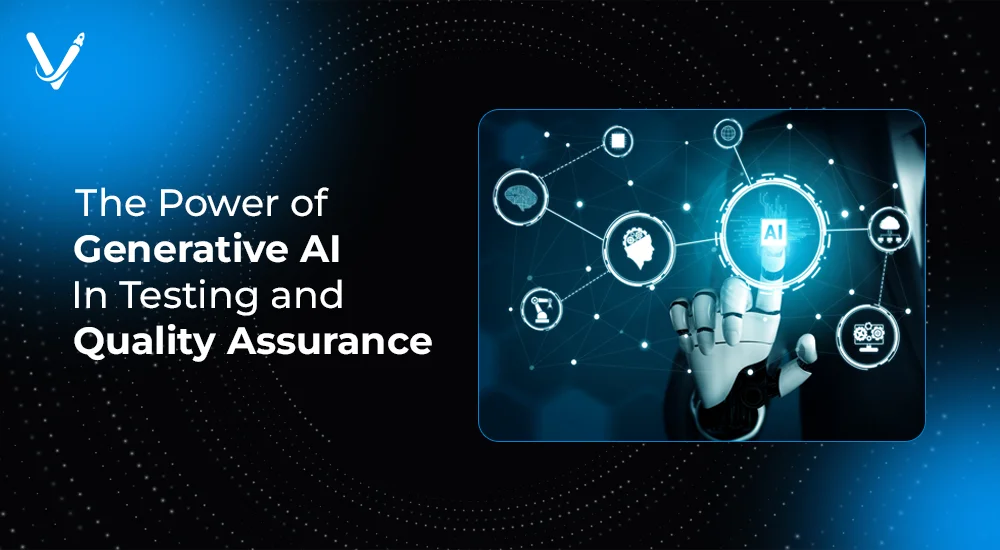The Power of Generative AI in Testing and Quality Assurance


- Apr 15, 2025



The software development landscape is in constant flux, driven by ever-increasing user demands for sophisticated, reliable, and secure applications. Traditional quality assurance (QA) methodologies, while valuable, are often struggling to keep pace with the rapid advancements in software complexity and deployment cycles.
This is where Generative AI emerges as a game-changer, offering the potential to revolutionize testing and significantly improve the overall quality of software products.
Generative AI, a subset of artificial intelligence, focuses on creating new content – in this case, test data, test cases, and even entire test environments – based on learned patterns and structures.
Unlike traditional testing approaches that rely heavily on manual effort and pre-defined scripts, generative AI leverages machine learning algorithms to automate and optimize various aspects of the QA process, leading to increased efficiency, reduced costs, and improved software quality.
Generative AI refers to algorithms that can create new content, such as text, images, code, or even test cases, based on the data it has been trained on. Unlike traditional rule-based systems, generative AI learns patterns, adapts to context, and can generate realistic, usable outputs with minimal human input.
When applied to testing and QA, generative AI has the potential to automate repetitive tasks, identify gaps in test coverage, simulate user behavior, and accelerate the entire QA lifecycle.
The applications of generative AI in testing are diverse and expanding rapidly. Some key areas include:
Generating realistic and diverse test data is crucial for comprehensive testing. Generative AI can automatically create large volumes of synthetic test data that accurately mimics real-world data, eliminating the need for manual creation or reliance on sensitive production data.
This is particularly beneficial for applications dealing with sensitive personal information (PII) where using real data is restricted by privacy regulations. Generative models can create realistic but anonymized data, ensuring compliance and allowing for thorough testing.
Creating comprehensive test cases is time-consuming and prone to human error. Generative AI can automatically generate test cases based on requirements specifications, design documents, or even existing code.
This significantly accelerates the test case creation process and ensures better test coverage, identifying potential defects that might be missed by manual testing.
The AI can generate various types of test cases, including unit tests, integration tests, and system tests, adapting its approach based on the specific application's architecture and functionality.
Setting up and managing test environments can be complex and resource-intensive. Generative AI can automate the provisioning and configuration of test environments, ensuring consistency and reducing the time and effort required for setting up testing infrastructure.
This includes configuring virtual machines, deploying applications, and setting up necessary network configurations, optimizing resource utilization and ensuring consistent test environments across different teams and locations.
Generative AI can analyze log files, error messages, and other relevant data to automatically detect and classify bugs. This speeds up the bug identification process and facilitates faster resolution.
The AI can also provide insights into the root cause of bugs, assisting developers in addressing them effectively.
The adoption of generative AI in QA offers numerous benefits, including:
Increased Efficiency and Speed: Automation of various testing tasks significantly reduces the time and effort required for testing, leading to faster release cycles. Improved Test Coverage: Generative AI can create more comprehensive test cases, ensuring better coverage of the software's functionalities a nd identifying potential defects that might be missed by manual testing. Reduced Costs: Automation reduces the need for manual labor, leading to significant cost savings in the long run. Enhanced Accuracy and Reliability: Automated testing minimizes human errors, leading to more accurate and reliable results. Improved Software Quality: Early detection and resolution of defects lead to higher quality software products. Better Resource Allocation: AI can help optimize resource allocation by focusing testing efforts on high-risk areas. Increased Scalability: Generative AI can easily scale to handle large and complex software projects.
Despite its potential benefits, implementing generative AI in testing presents certain challenges:
Data Requirements: Generative AI models require large amounts of high-quality training data to perform effectively. Gathering and preparing this data can be time-consuming and resource-intensive.
Model Training and Maintenance: Training and maintaining AI models requires expertise in machine learning and data science.
Integration with Existing Systems: Integrating generative AI tools with existing testing frameworks and workflows can be complex.
Explainability and Interpretability: Understanding how generative AI models arrive at their conclusions can be challenging, making it difficult to debug or troubleshoot issues.
Cost of Implementation: Implementing generative AI tools can involve significant upfront investment in infrastructure, software, and expertise.
Ethical Considerations: Ensuring the ethical use of generative AI, particularly in generating synthetic data, is crucial.
The future of generative AI in testing looks bright. As the technology continues to evolve, we can expect further advancements in its capabilities and wider adoption across the software development lifecycle. We can anticipate:
More sophisticated algorithms: Advancements in machine learning will lead to more accurate and efficient generative AI models.
Improved integration with existing tools: Seamless integration with existing testing frameworks and CI/CD pipelines will become more common.
Wider adoption across industries: Generative AI will be adopted by a wider range of industries beyond software development.
Increased focus on explainability and interpretability: Efforts will be made to make AI models more transparent and understandable.
Development of specialized AI tools: Specialized tools will be developed to address specific testing challenges in different domains.
Generative AI is transforming the landscape of testing and quality assurance, offering the potential to significantly improve software quality, reduce costs, and accelerate development cycles. While challenges exist, the benefits of adopting this technology are undeniable.
Vasundhara Infotech is at the forefront of this revolution, leveraging the power of generative AI to deliver superior QA services to our clients being a leading AI development company. We help organizations navigate the complexities of AI implementation and integrate it seamlessly into their existing workflows. Our team of experienced QA professionals and AI experts are committed to providing innovative solutions that meet the evolving needs of our clients.
Ready to elevate your software testing and quality assurance to the next level with the power of Generative AI? Contact us today for a consultation and discover how our innovative QA services can help you deliver superior software products. Let us help you harness the transformative potential of AI and achieve unparalleled levels of quality and efficiency.
Copyright © 2026 Vasundhara Infotech. All Rights Reserved.